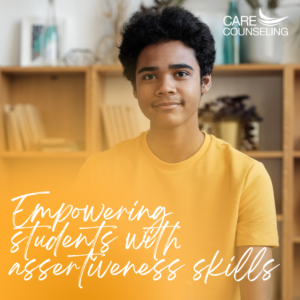Empowering Students with Assertiveness Skills
 Assertiveness is a crucial life skill that empowers students to express their thoughts, needs, and opinions confidently and respectfully. It enables them to advocate for themselves in various situations, from academic settings to social interactions. By cultivating assertiveness skills, students can boost their self-esteem, build healthy relationships, and take charge of their own lives.
Assertiveness is a crucial life skill that empowers students to express their thoughts, needs, and opinions confidently and respectfully. It enables them to advocate for themselves in various situations, from academic settings to social interactions. By cultivating assertiveness skills, students can boost their self-esteem, build healthy relationships, and take charge of their own lives.
The Importance of Assertiveness:
Assertiveness is the middle ground between passivity and aggression. It involves expressing oneself clearly, standing up for one’s rights, and respecting the rights of others. Students who are assertive are more likely to:
- Communicate Effectively: Assertive students can express their ideas and feelings confidently, leading to clearer communication with teachers, peers, and family members.
- Build Self-Confidence: By advocating for themselves, students develop a sense of self-confidence and belief in their abilities.
- Set Boundaries: Assertiveness allows students to set and maintain healthy boundaries in their relationships, preventing others from taking advantage of them.
- Handle Peer Pressure: Students who are assertive are better equipped to resist peer pressure and make decisions aligned with their values.
- Resolve Conflicts: Assertive students can address conflicts in a constructive manner, leading to better problem-solving and healthier relationships.
Practical Strategies to Develop Assertiveness:
- Teach Effective Communication:
Encourage students to use “I” statements to express their feelings and needs. Teach them to listen actively and paraphrase to ensure they understand others’ perspectives.
- Role-Playing Exercises:
Organize role-playing exercises where students can practice assertive responses to different scenarios, such as saying no to peer pressure or asking for help from a teacher.
- Foster a Supportive Environment:
Create a classroom or home environment where students feel safe expressing themselves without fear of judgment or ridicule.
- Encourage Goal Setting:
Guide students in setting realistic goals and breaking them down into manageable steps. This can boost their confidence and assertiveness in pursuing their aspirations.
- Provide Positive Feedback:
Acknowledge and praise assertive behaviors in students. Positive reinforcement can encourage them to continue using these skills in various situations.
- Teach Problem-Solving:
Teach students effective problem-solving techniques, such as identifying the issue, brainstorming solutions, and evaluating their effectiveness.
- Promote Resilience:
Help students build resilience to cope with setbacks and criticism, which can enhance their ability to assert themselves confidently.
- Model Assertiveness:
As educators and parents, model assertive behavior in your interactions with students and others. Show them how to express their needs respectfully.
Empowering students with assertiveness skills is a transformative process that equips them with invaluable tools for personal and academic success. By learning to communicate effectively, set boundaries, and handle conflicts constructively, students can navigate various challenges with confidence and self-assurance. As parents and educators, fostering a supportive environment, providing positive feedback, and modeling assertiveness are instrumental in helping students embrace this essential life skill. By nurturing assertiveness in students, we pave the way for them to become empowered, self-assured individuals who can advocate for themselves and make a positive impact in their lives and the lives of others.



























